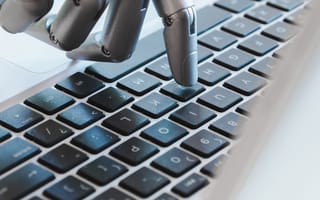Amelia keeps a busy schedule. A typical day at work for her could include onboarding a new employee in the morning, managing AWS servers in the afternoon and remotely screening a concerned co-worker for COVID-19 in the evening.
Amelia is not a startup founder in over her head. She’s a “digital worker” created by IPsoft, which develops AI-powered enterprise technology designed to automate repetitive tasks and enable companies to scale their customer service operations. IBM defines a digital worker as “software-based labor that can independently execute meaningful parts of complex, end-to-end processes using multiple skills.” When onboarding new employees, for example, Amelia navigates the process using eight different skills, which include the ability to update payroll information, distribute personalized FAQ documents and manage email addresses.

“We’re seeing increased integration between human and digital employees in the workplace to drive positive experiences and outcomes for all of an organization’s stakeholders — customers, partners, employees and shareholders alike,” IPsoft CEO and Founder Chetan Dube said in a recent company press release.
Dube has reason to be bullish on the future prospects of digital workers. A recent IDC study estimates that the contributions of digital workers to the global workforce will grow by 50 percent over the next two years. In addition to administrative work, the study also estimates an uptick in digital workers performing tasks that require reasoning, decision-making skills and the evaluation of information.
IPsoft is getting a jump on this expected surge in demand with DigitalWorkforce.ai, a marketplace for digital workers that launched in February. We spoke with Marie Angselius, global head of communications for IPsoft, about the marketplace and the capabilities of its digital workers, which, yes, all go by the name “Amelia.”

Can you talk about the origins of DigitalWorkforce.ai? When did IPsoft decide to build a marketplace for digital workers, and did the project change or evolve over time?
In 2018, IPsoft launched the embryo of a marketplace based on Amelia’s extensive experience. This was the first off-the-shelf marketplace for AI solutions specifically designed for the banking, telecom, hospitality, insurance and healthcare industries. Back then, our marketplace primarily had reusable components that served to help kick-start projects, which meant our customers still had to do additional work. Our marketplace has since evolved into a full-fledged store where users can browse, interview and onboard digital workers.
DigitalWorkforce.ai offers two kinds of digital workers: one that fills the role of an IT service-desk engineer and another that serves as an HR coordinator. What can these “employees” do?
The world of work is changing dramatically, and digital employees will play a key role in helping small businesses run smoothly by managing repetitive requests and processes in the background, like collecting expense reports, troubleshooting equipment and configuring devices. In the future, we’ll also see business owners employ digital employees in a variety of vertical roles, and in the next five years the volume and complexity of tasks that digital workers can handle will only become more impressive and more transformational.
These digital workers come with a set of skills out of the box, but they also have the ability to learn on the job. How exactly does that work in practice?
Amelia V4 introduces a new level of end-to-end learning. Previously, building new end-to-end skills had several manual steps including back-end integrations. IPsoft defines these end-to-end processes as those that start with an individual requesting assistance and continuing through conversation to a front- or back-office employee, who then accesses one or more applications to resolve the request. Amelia can observe that entire process and synchronize all the parts into a coherent flow to build an automation which can perform this task without any human involvement.
In addition to HR and IT digital workers, IPsoft just rolled out a “COVID-19 assistant.” How exactly does this application work?
IPsoft recently announced the launch of a free digital employee to help screen for indicators of the novel coronavirus. This interactive screening solution was released as a service to communities seeking clear, authoritative information on symptoms and risks. While engaged in conversation, Amelia will assess a user based on their current symptoms and potential risk factors, leveraging the latest information from the Centers for Disease Control and Prevention and the World Health Organization.
As more American cities restrict movement, the new Amelia aims to provide the general public, as well as vulnerable populations, with accurate and on-demand information about COVID-19 with no risk of exposure. This version of Amelia also aims to relieve the hospitals, clinics, physicians’ offices and medical care centers from fielding non-urgent questions related to COVID-19.
Gartner estimates that 25 percent of digital workers will use virtual employee assistants by 2021. How will DigitalWorkforce.ai evolve to meet this increased need?
According to the World Economic Forum’s Future of Jobs Report 2018, 133 million new roles may emerge that will be adapted to the new division of labor between humans, machines and algorithms. With DigitalWorkforce.ai, the market moves closer to IPsoft’s vision of a symbiotic digital-human workforce, giving companies the ability to fully harness the potential ROI in AI.




